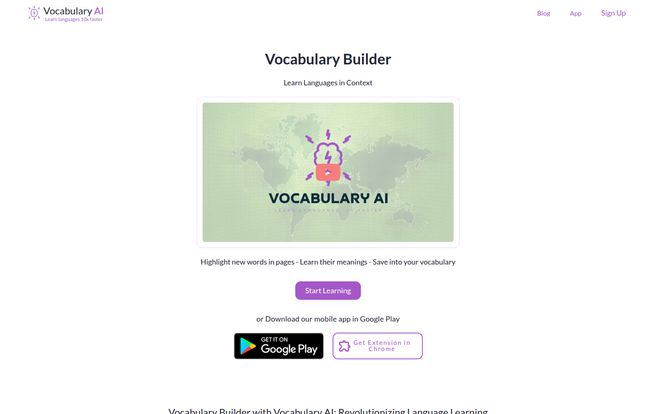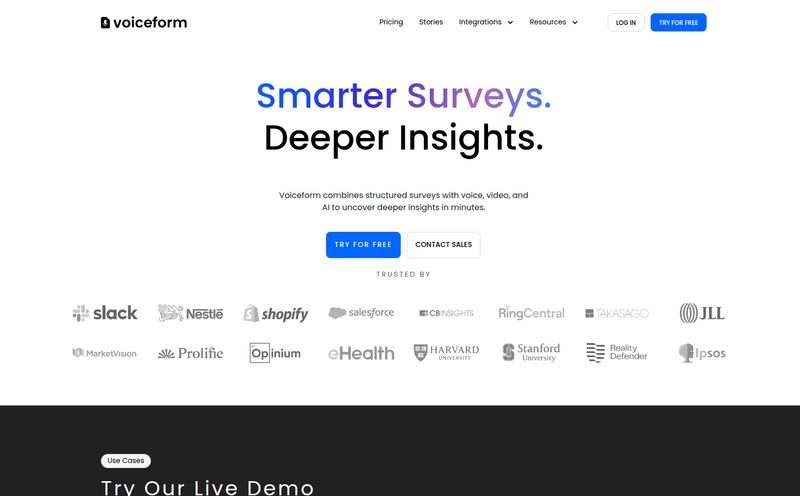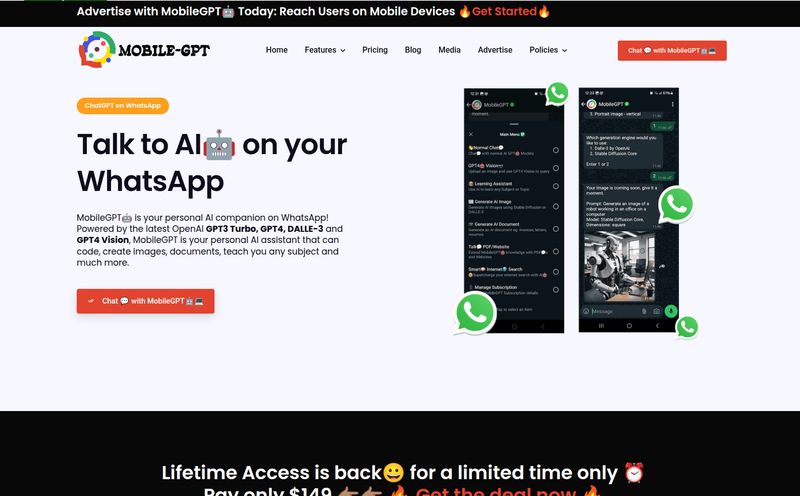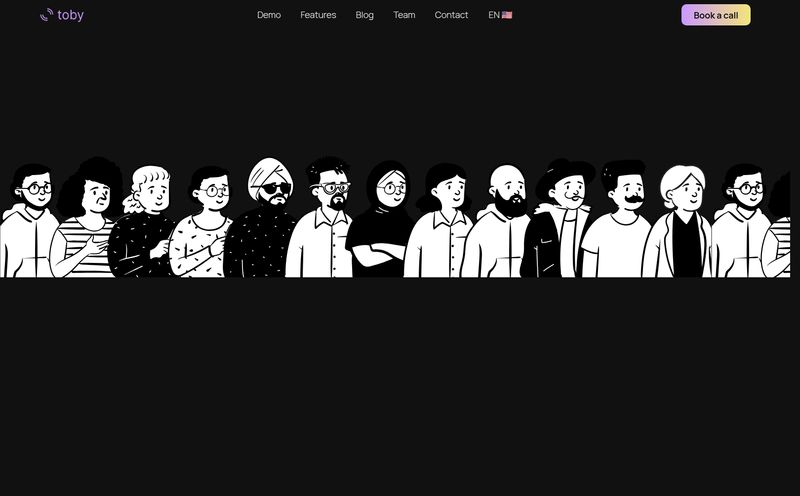As someone who spends half their life buried in international SEO reports, industry blogs from across the pond, and technical documentation, I’m constantly bumping into new words. You know the drill. You highlight a word, pop it into Google Translate, get the meaning, nod wisely, and then… poof. An hour later, that brilliant new term has vanished from your brain like a dream you can’t quite recall.
It’s the language learner’s curse. We’re swimming in information, but we’re trying to hold it all in a leaky bucket. I've tried flashcard apps, notebooks, and just plain old hope. Most systems are either too clunky or they just don’t stick. So when I stumbled upon Vocabulary AI, I was skeptical but intrigued. Another flashcard app? Another dictionary? No, this felt different.
It claims to be a language-learning platform built by someone who faced the exact same problem—a developer from Ukraine who got tired of re-learning the same technical English terms over and over. That, right there, got my attention. It wasn’t built in a corporate lab; it was born out of genuine need. And honestly, those are always the tools that work the best.
So, What is Vocabulary AI, Really?
Think of Vocabulary AI less as a dictionary and more as a personal vocabulary trainer. It’s a clever ecosystem combining a website, a mobile app, and its crown jewel: a Chrome browser extension. The whole idea isn’t to just give you a one-time translation. It’s designed to capture the words you encounter naturally while browsing the web and then systematically drill them into your long-term memory.
You’re reading an article, a report, or even just a tweet in another language. You see a word you don't know. Instead of opening a new tab, you just highlight it, click the Vocabulary AI icon, and boom—it's saved to your personal list, complete with definition and even audio pronunciation. It’s seamless.

Visit Vocabulary AI
The Secret Sauce: How It Makes Vocabulary Stick
This is where things get interesting. It’s not just about collecting words. Anyone can make a list. The real magic is in the retention, and Vocabulary AI has a pretty solid method for that.
It’s All About Context and Convenience
The browser extension is the star of the show, in my opinion. The best time to learn a word is the moment you need it. By allowing you to save words directly from the source, you’re not just learning a word in isolation; you’re learning it with the context of where you found it. This creates a much stronger mental link than a random word on a flashcard.
The Science of Not Forgetting: The Ebbinghaus Method
Remember that leaky bucket I mentioned? Well, Vocabulary AI uses something called the Ebbinghaus forgetting curve to plug the holes. It’s a well-known psychological principle that describes how our memory of new information fades over time. We forget things fastest right after we learn them.
The platform cleverly uses this theory to its advantage. It schedules reviews of your saved words at specific, increasing intervals. It’ll bring a word back to your attention right when you’re most likely to be forgetting it. That first review might be in a day, the next in a few days, then a week, and so on. This process of spaced repetition is scientifically proven to move information from your shaky short-term memory into your much more reliable long-term memory. It’s like having a tutor who knows exactly when to give you a pop quiz.
What I Love (And What to Keep in Mind)
No tool is perfect, especially one that's still growing. After playing around with it for a while, here's my honest take. The platform is incredibly effective at its core mission: building and retaining vocabulary. The convenience of highlighting a word and having it instantly saved with audio and definitions is a game-changer for anyone who reads a lot of foreign content. The multi-platform access—desktop, mobile, even Telegram—means you can practice on the go. It just fits into your life, rather than forcing you to make time for it.
On the flip side, you can tell it's still in its early stages. Right now, the focus is heavily on English, so if you're learning Swahili or Korean, you might have to wait a bit. The developers are upfront about this, though, and are planning to add more languages. Also, it’s not a magic pill. You have to use it consistently. Saving words is easy, but you still have to do the scheduled reviews for the spaced repetition to work its magic.
The Price is... Free? (For Now)
This is the part that made me do a double-take. The creator is currently looking for early adopters to provide feedback and help shape the future of the platform. In exchange, they're offering lifetime free access to all premium features.
Let me say that again: lifetime free access. In a world of endless monthly subscriptions, that’s a pretty incredible offer. I have no idea how long this will last, so if you're even remotely interested, I'd jump on it. It’s a fantastic opportunity to get in on the ground floor of a promising tool without spending a dime.
Who Is Vocabulary AI Really For?
- The Professional: If you're like me, reading technical documents, foreign market reports, or industry news, this is a must-have. You can build a specialized vocabulary for your field effortlessly.
- The Student: Whether you're studying for a language exam or reading academic papers, this is way more efficient than manual flashcards.
- The Avid Reader: Love reading blogs, news, or books in their original language? This tool lets you absorb the story without losing your flow, while still capturing new words to practice later.
- The Curious Language Enthusiast: Basically, anyone who wants a smarter way to learn and not forget.
Frequently Asked Questions
How is Vocabulary AI different from Google Translate or DeepL?
While tools like Google Translate are great for instant, one-off translations, they don't help you actually learn or retain the words. Vocabulary AI is built for long-term retention. It saves your words and uses a science-backed method (spaced repetition) to ensure you remember them.
What platforms can I use it on?
It’s pretty flexible! You can use the main website, the mobile app (currently on Google Play), and the Google Chrome browser extension. They even have an integration with Telegram.
Is it only for learning English?
Currently, it's most robust for English learners. However, the developers have stated that they plan to add support for more languages in the future as the platform grows.
How does the lifetime free access work?
As of now, the platform is in an early-adopter phase. By signing up and providing feedback, users can get lifetime access to all premium features for free. This offer is for a limited time to help them build their user base and improve the product.
Is it complicated to set up?
Not at all. The easiest way to start is to install the Chrome extension. From there, you just browse the web as you normally would. When you find a new word, you highlight it, and the extension does the rest. It's incredibly user-friendly.
My Final Verdict: Is It Worth Your Time?
Absolutely. Yes. 100%.
Vocabulary AI addresses a genuine, frustrating pain point for language learners in a simple, intelligent way. It’s not trying to be a full-blown language course like Duolingo or Babbel. It does one thing—build and retain vocabulary—and it does it exceptionally well. It bridges that frustrating gap between understanding a word once and actually knowing it forever.
Given that you can get in on the ground floor with a lifetime free deal, it’s a complete no-brainer. You’re not just getting a tool; you’re investing in a smarter way to learn. And in our line of work, a stronger vocabulary is never a bad investment. Give it a try; I think you'll be pleasantly surprised.
Reference and Sources
- Vocabulary AI Official Website
- Simply Psychology: Ebbinghaus' Forgetting Curve And Spaced Repetition



